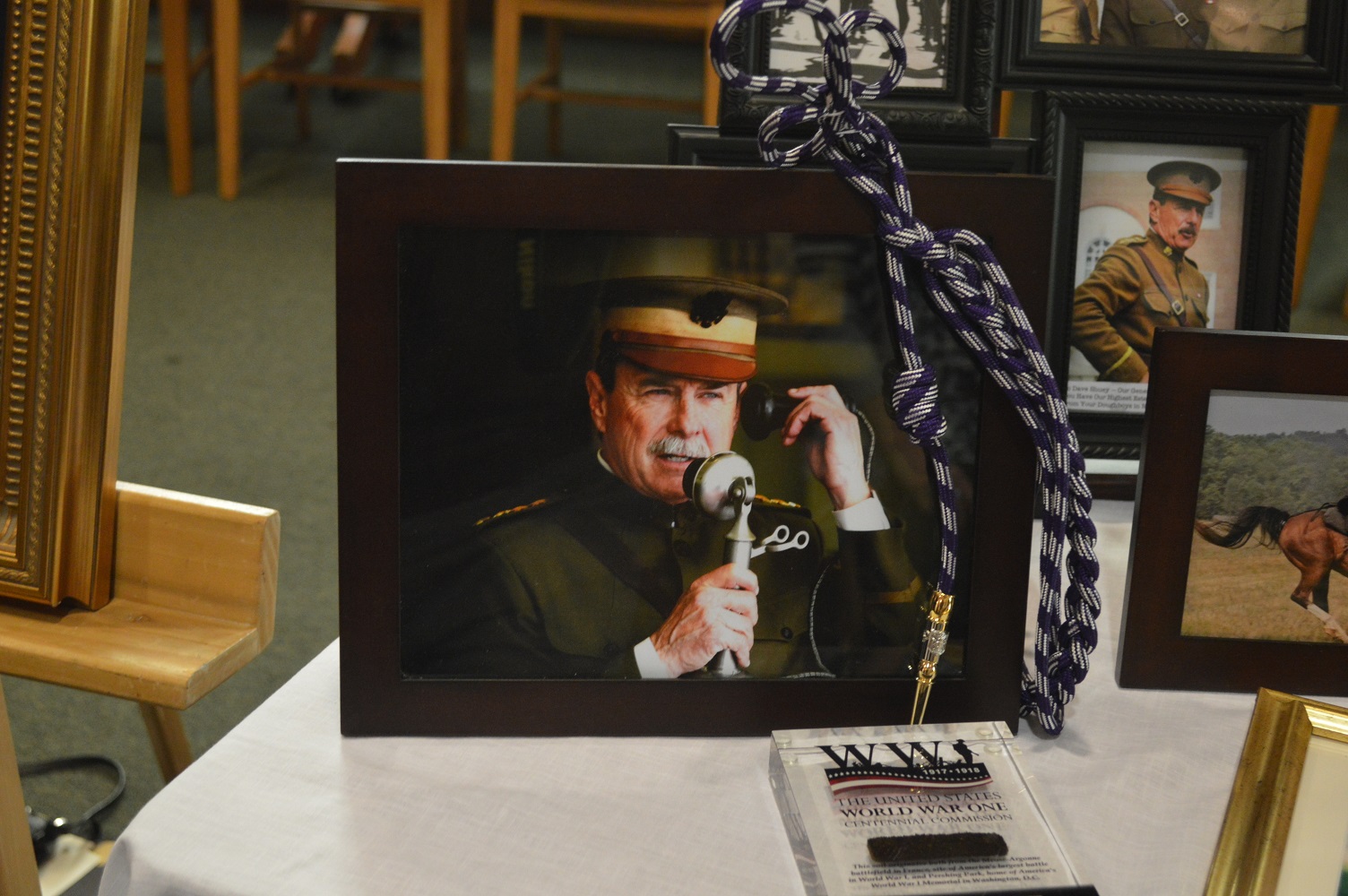David Shuey: Remembering the consummate Living Historian
Carlisle, PA: There is a WWII uniform hanging in my closet which wasn’t there six months ago. The badges on the epaulets may say “U.S. War Correspondent,” but please know this: it is not a theatrical costume. I actually wear that uniform, as well as other pieces I’ve assembled, in my work as a journalist while covering living history events. For the longest time, I hesitated to go reenactor gonzo with my job. Then David Shuey – actor, reenactor and living historian – told me, “You know, I could talk all day about Gen. Pershing or JEB Stuart and the Civil War, and no one would give a damn. But once I put on a uniform and get on my horse, I have their undivided attention.”
And so he did.
I first encountered Dave in Washington D.C. at the 2015 Air Force Association Convention. I was there that day to do a followup story on the late Jerry Yellin – the Army Air Force pilot who led the last combat mission against the Japanese during WWII. Jerry was set to receive the Association’s 2015 Hoyt S. Vandenberg Award.
To say I first “encountered” Dave that day is no misnomer. With his smart service cap, four gold stars, calf-high riding boots, khaki britches, and mustard green tunic – David Shuey clearly stood out amongst a sea of Air Force blue. I followed Dave from the auditorium, where he watched as the association presented Jerry with the award, across the hall, down the escalator, and into the exposition area. There I lost him – until I turned a corner and found Dave and Chris Isleib manning the U.S. World War I Centennial Commission booth. Of course, once I got to the booth, Dave’s entire getup made perfect sense.
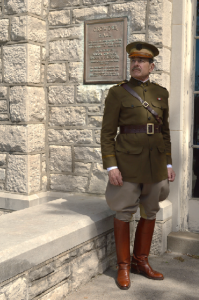
“General Pershing?” I demurely asked.
“Right you are, Sir!” he zealously replied.
“How is that hunt for Pancho Villa going?” I inquired.
David grinned and started to laugh.
Never the shy one, Dave quickly returned to character and pounced on me with the $64,000 question: “What, Sir, may I ask, do you know about World War I?”
I mentioned a few things about the American involvement in the war; noted that Elbert Hubbard died in the sinking of the Lusitania, and Quentin Roosevelt perished when his plane was shot down over France in 1918.
“This is very rare indeed,” he exclaimed. “You must be a scholar. And what else, may I ask, do you know?”
I told him one of the most interesting facts I knew about the war was that his aide (that is, Gen. Pershing’s aide) – Lieut. George S. Patton – is said to have walked behind the German lines alone one night for the purpose of reconnoitering the enemy position and assessing their strength. That hazardous hike likely made Patton the first American to enter Germany during World War I.
“Amazing!” said Dave. “How is it you know so much about the war?”
“Oh,” I replied, “I was born in Verdun.”
The smile on Dave’s face was a sight to behold. You’d have thought I’d just told him that I served under Pershing at the Meuse-Argonne.
What should have been a five-minute conversation went on for almost an hour. David was like a sponge, soaking up what little information I offered, while simultaneously dispensing his own wealth of knowledge, eagerly and energetically.
The irony about that day is that I had traveled to D.C. to cover an award ceremony for a WWII vet and came away determined to thoroughly cover the WWI Centennial. All thanks to David Shuey.
The following year, another event occurred with ramifications which may yet rival WWI.
America elected a new president.
That fall, I had written a piece about a group which stages Great Gatsby-themed lawn parties in New York and D.C. The group – Dardanella – was planning a strictly non-political Inaugural Ball in Washington. I had wrangled a press invitation because I thought covering an Inaugural Ball might be fun, but as I looked over the program, it occurred to me that something was missing.
What this event needed was a visit by the one icon of the Great Gatsby era: General John J. Pershing.
I reached out to David, and he readily agreed.
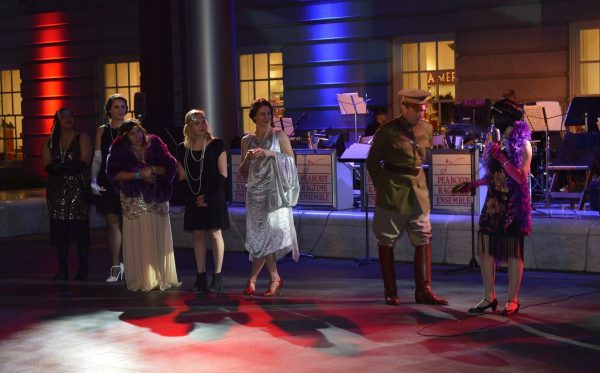
“You know, Pershing was the true rock star of that era,” said David. “There was even serious talk of electing him president.”
Emails were exchanged with Paul Ervin, the founder of Dardanella, and with Chris Isleib, who also thought it was a great idea.
Unbeknownst to me, David and his wife Susan were in Virginia Beach that week, spending some precious time with their son Nate – a Navy pilot who was about to ship off for several months. The decision to break away – even for one night – could not have been easy. But David was a man on a mission when it came to promoting the WWI Centennial.
The following day, I reported that the Inaugural Ball went off without a hitch. The food was great, the band superb, and the venue – the National Portrait Gallery – couldn’t have been a better choice. But the stand-out that night was David Shuey – from posing for dozens of pictures with party-goers to leading the crowd in contests and song.
I guess David was right: Pershing sure seemed to be the true rock star of that era.
A few months later, at Dave’s behest, I would join him in Kansas City for the Anniversary Commemoration of the start of WWI. Making such a trip would have normally been impossible for this reporter, but Dave assured me that if I could get to K.C., I could bivouac with him while I was there.
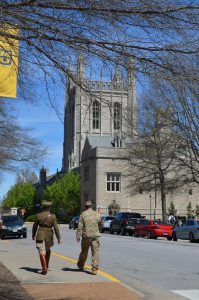
“If you’d like,” he continued, “I have several other gigs while I’m in Missouri. If you care to join me and do some of the driving, I’ll take care of the lodging and we can split the meals.”
That was an offer I couldn’t refuse!
Our journeys around Missouri took us to MIZZOU, where he gave a very animated talk for the ROTC: to Fulton for another talk at a National Guard facility; to Versailles, where we tried – unsuccessfully – to engage the local populous in a discussion about the treaty which ended WWI; and to Laclede, where we had a private tour of the John J. Pershing Boyhood Home State Historic Site.
I learned a few things about Dave on that trip – and these are the things well worth noting:
> He did NOT like being late for anything. He could get quite agitated if it appeared we would arrive somewhere late, but once we were there, he relaxed completely and almost immediately transformed into his Pershing persona.
> He was very particular about his uniform, though he did complain that his boots were a size too small. “I knew they were too small when I bought them off of ebay, but these suckers are expensive,” he said. “The one thing that they do is make me walk a bit taller, which is perfect when I’m in character.”
> David could talk with anybody. This was evidenced many times on that trip, as well as other events, such as the AFA Convention and the Inaugural Ball. If the WWI Centennial Commission was looking for an engaging spokesman, they couldn’t have picked a more perfect candidate than David Shuey.
> He was proud to be an American and had a real sense of our place in World History, but he was not a political hack and expressed a disdain for what he considered the extremes of both parties.
> More than being an American, David was proud of his son Nate and that he had chosen a career in the service of his country.
My last conversation with David was via text messages after his July surgery. In it, I expressed my regrets that I would not see him at Governors Island in September but hoped catching up with him in D.C. on Nov. 11 was still in the cards.
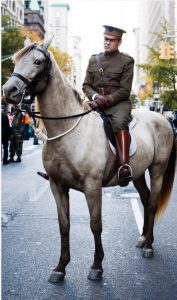
“I think that is doable,” was his simple reply.
In a way, I firmly believe that David was right.
November 11 was originally celebrated here in America as Armistice Day – a holiday to remember the day WWI ended. On November 11, 1919, – the first Armistice Day – President Woodrow Wilson issued a message to express what he felt the day meant to Americans. Wilson said in part:
“To us in America the reflections of Armistice Day will be filled with solemn pride in the heroism of those who died in the country’s service, and with gratitude for the victory, both because of the thing from which it has freed us and because of the opportunity it has given America to show her sympathy with peace and justice in the councils of nations.”
The uniform David Shuey wore was a reenactor’s representation. But make no mistake about it: David wore that uniform not only to personify Gen. Pershing, but to remind us all of the horrific toll exacted by World War I. It was his hope that by appearing as Pershing, America would finally do the right thing, and honor the Doughboys with their own monument in our nation’s capital.
In that sense, our “Gen. Pershing” died in the service of his country.
I’ll share just one more story about David, which I think speaks volumes about his character.
The night of the Inaugural Ball, Dave parked on the outskirts of D.C. and came into town using public transportation. As the time grew late, he became concerned that he might miss the last train back to where he was parked. I told him not to worry – I was parked in a lot nearby and would be happy to give him a ride to his car.
Making our way to said lot, sometime after midnight, through the still bustling streets of D.C., we encountered a group of police officers – clearly exhausted after a very long and taxing day. As I said at the onset, Dave cut a striking figure in his WWI uniform. The tuckered cops – seeing those four gold stars on his epaulets – snapped to attention and saluted Dave. He could have simply waved them off, but instead, crossed the street in those boots that were killing him, to personally thank the police officers for the important service they were rendering.
And that’s just the kind of guy he was.
In my book, David Shuey was a true rock star.
David W. Shuey, age 63, passed away on Monday, September 17, 2018 after a long battle with cancer. Dave’s memorial service was held yesterday at the First Presbyterian Church on the Square in Carlisle, PA. A full obituary may be found here.
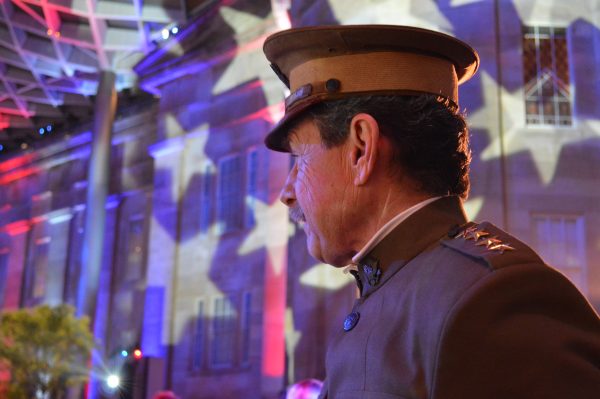

Anthony C. Hayes is an actor, author, raconteur, rapscallion and bon vivant. A one-time newsboy for the Evening Sun and professional presence at the Washington Herald, Tony’s poetry, photography, humor, and prose have also been featured in Smile, Hon, You’re in Baltimore!, Destination Maryland, Magic Octopus Magazine, Los Angeles Post-Examiner, Voice of Baltimore, SmartCEO, Alvarez Fiction, and Tales of Blood and Roses. If you notice that his work has been purloined, please let him know. As the Good Book says, “Thou shalt not steal.”

